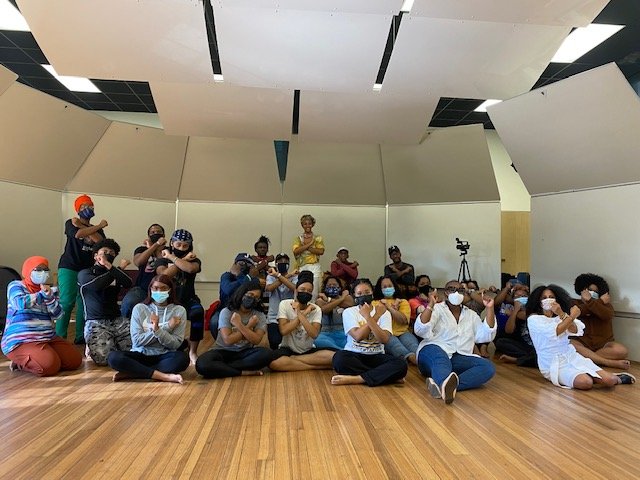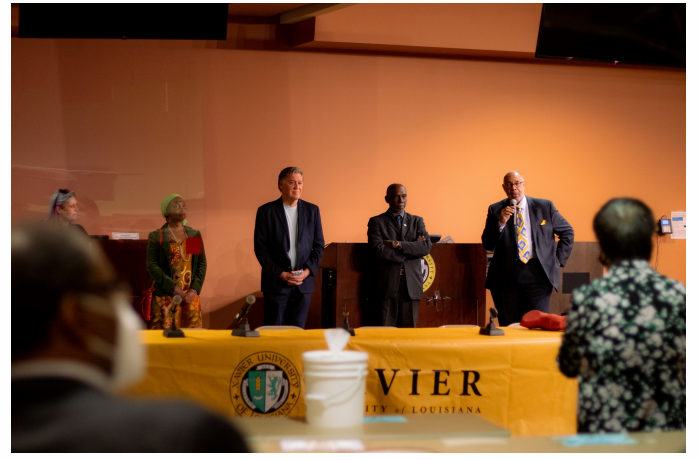By Madison Brydie
On Saturday, 13 November, Xavier University hosted the ‘El Corazon Cubano: Celebrating the African Heartbeat of Cuba’ presented in the campus’ Opera Workshop. From 10:00 a.m. to 5:00 p.m. guest clinicians explored the African influences in Cuban Culture through interactive language, dance, and percussion classes in Xavier’s Music Building. Cultural differences and similarities, such as dialect, within the African community were emphasized during this time.
“They [dialects] represent the people before you, and who taught you how to speak by accepting who you are and expressing how you want people to accept you,” said Dr. Carmen Cosme, 44-year-old Assistant Professor of Spanish in the Department of Languages and of Afro Latin-American Studies at the Xavier University of Louisiana.
To begin the journey to the heartbeat of Cuba Dr. Carmen Cosme, Iyalosha Afro-Cuban Specialist, instructed ‘Introduction to Cuban Dialect’. The class highlighted the Cuban dialect and the different ways it articulates the originally imposed Spanish language.
“They used the language to resist,” Cosme said, by modifying words to accommodate sounds that originated from West Africa. This modification was compared to both Haitian creoles known to New Orleans and African American slang. Dr. Cosme explained the importance of understanding the connections between the different sub-communities created by the African Diaspora, including the correlation in the dialects and the history in traditional dance.
“So we got to move it back when we were all still in Africa. The way we praise our God, the way that we worship everything that we did in the community you worship, was music dancing involved,” said Andrea Peoples, 39-year-old West African Dance Instructor.
One of the other highlights of the celebration was the Dance workshop instructed by Andrea Peoples. Peoples taught a packed room of students and local adults the dances of The Orisha.
“A Pythoian of spirit so we danced for Ochun and Shango today,” said Peoples. The dance workshop was immersed in culture as instructor Andrea explained the ancestry behind each step.
“As African-American we still see remnants of that in church…….catching the Holy Ghost, so then when you go to Cuba a lot of their work in the community is in their houses and the same thing is you play music and dance………. the connecting factor is music that we brought with us that has kept us connected to who we are originally,” Peoples said.
She empowered both the men and women in the room through the connections to both masculinity and femininity made during the dance. Many Xavier students danced joyfully as they learned about their connections to this heritage and the traditional Cuban dances of Orisha.
“I enjoyed the dances because I didn’t know any of the dances and it was fun getting tapped into that,” said Xavier student Anesia Jones, 18-year-old Afro-Cuban Neuroscience major
Other classes like “Cuban History and Identity in Cecilia Valdes” taught by Dr. Carmen Cosme was offered for participants to completely understand and reiterate what was introduced in the dance workshop. Students were also given the opportunity to learn in a Percussion Workshop taught by Bill Summers, a grammy-nominated Percussionist. Throughout the entire workshop, students developed connections to the “Afro” in Afro-Latina and further their understanding of the relation of Cuban culture to African Americans specifically in the present today.
“Sub Afro communities is where most music came from. It’s where a lot of the music we listen to today, the beats and the rhythms and even the dance styles actually came from,” Jones said.
The culture and experiences of an African-American and an Afro-Cuban are seen to be that of a distant twice removed cousin. In which more often than not the African and Hispanic heritage are seen as mutually exclusive resulting in a dissociation between the culture and heritage of an African-American and an Afro-Cuban.
“In an HBCU it’s beautiful that we feel that all these black people everywhere makes us feel like we’re not the only one and it’s great, but also sometimes we forget that within our community there is a lot of diversity,” said Event Organizer Dr. Sakinah A. Davis, 33-year-old Assistant Professor of Voice and Director of Opera Workshop.
However the shared past between an African American and Afro-Cuban results in a strong connection and similarities spilling into music, dialect, and dance.
“That makes us as a community richer and I feel like we can be unified with all that diversity and all that richness and we don’t have to think that we are the same,” Davis said.
Interested in future events? Email Dr. Sakinah A. Davis at sdavis36@xula.edu




